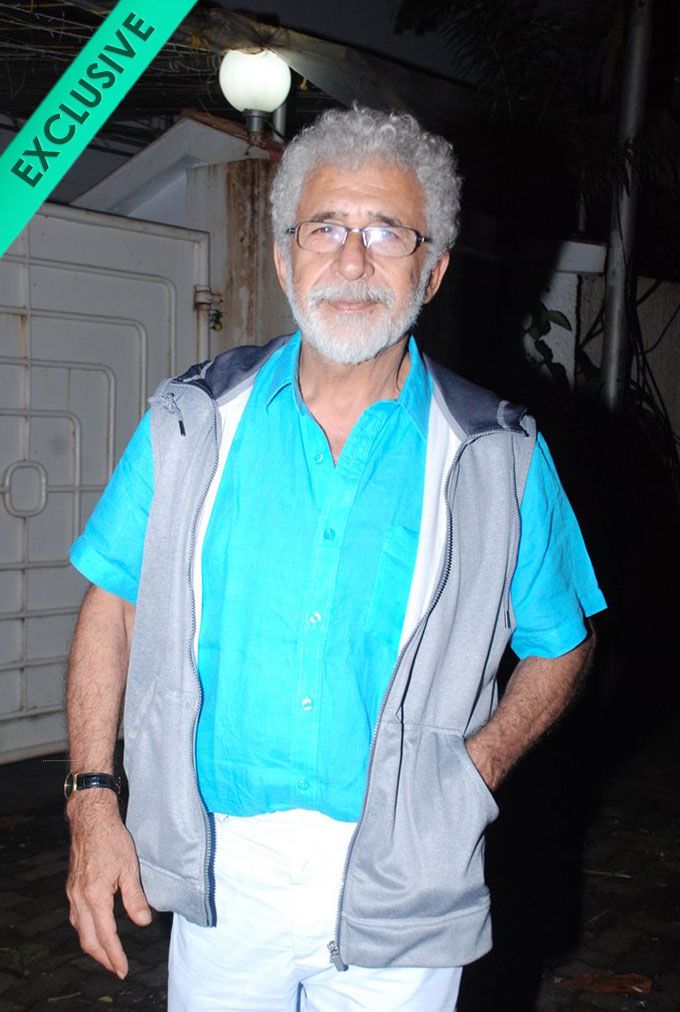
Have you ever been in a room where you felt that you’re truly fortunate to be there? You felt something beyond words or explanations? It’s almost intimidating and yet not. You feel an urge to say all the right things… the sounds in your head warn you, “Be smart!” “Don’t ask stupid questions. Don’t sound like a groupie! (though in your head and often in reality you are).”
And then you try to breathe…
Well almost!
I’ve known Naseeruddin Shah for a couple of years now. I have worked with him on a professional level and also had the opportunity of conversing with the man off the record. Every interaction has left me with a flavour different from the other, albeit never disappointing! When I first thought of writing this piece, I wondered what ‘story’ I would tell. Only to realise I didn’t want to, as he is doing that himself with his book, and I would rather give you a glimpse of a man so “real”, you find yourself feeling grateful ‘to bear witness’.
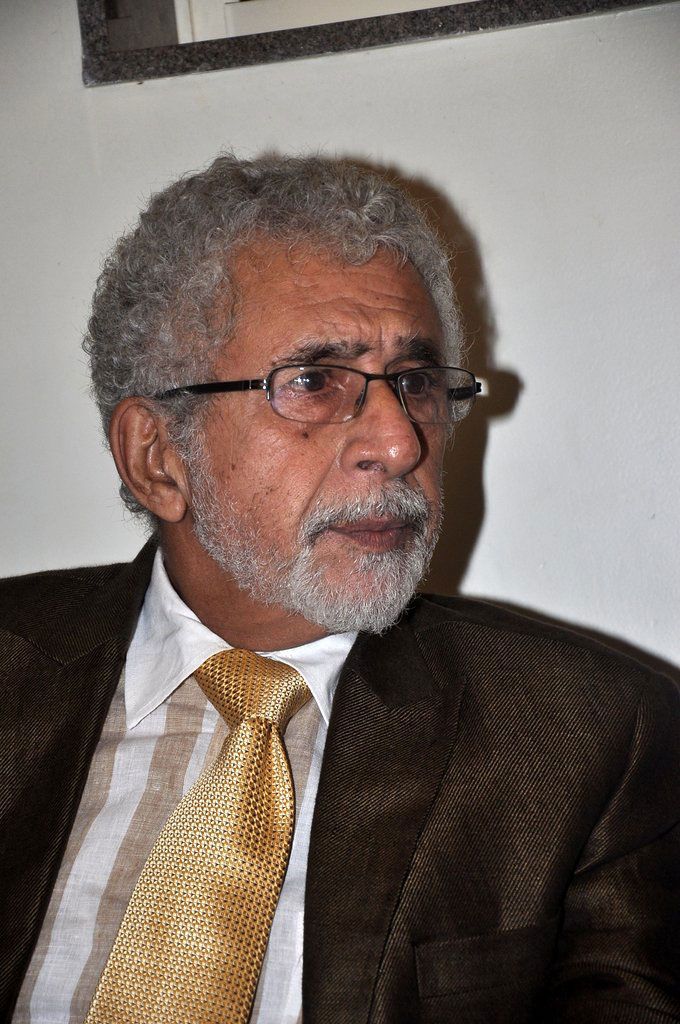
Let’s begin at the beginning:
“I am the youngest of five brothers, two of whom passed away at birth. I was about two when we left Barabanki and moved to Bareilly and then to Lucknow. I have very hazy memories of both these places but the ones I have are very vivid.”
Memory is one strange lady as she enables you to relive an experience and at the same time plays hard to get at her own peril. This holds most true to people who have lived life on the move.
“One of the memories that has stayed with me is of this one guy who was performing, and it seems to me like he was at that height [points to the ceiling]. I was so small [points to a foot of the ground] that it must have seemed like he was at that height. He could have been a clown standing just a few feet above me. I remembered being utterly mesmerised. His face was painted, he had these black thick lines around his eyes wearing a colourful costume, some sort of a cap. He was doing this kind of dance, I don’t know why [chuckles] this has stayed stuck in my mind. It was terrifying and while I was writing the book I recalled it vividly. My brothers weren’t there, so there is no one who can confirm it happened. But I think it did. I couldn’t have just invented it because I can still recall how I felt at the time. I wanted to be there up there with him. I was just totally in awe.”
This I guess was the point in his life when the seeds of the performing arts were sown. Thank God for that. Can you imagine Indian cinema without the presence of this legend?
On his father….
“My father was in the Provincial Civil Services, what was called PCS at the time, which later became UPCS Uttar Pradesh Civil Services [equivalent of the IAS]. He was a deputy collector and his last posting was in Nainital. His work life took him to Haldwani, Bareilly, Lucknow, Barabanki and several others.”
“I can recall my dad yelling at the chaprasis. I can recall a couple of shikaras when we were really little. Hazy memories. Then dad got transferred to Nainital where he put us into St. Joseph’s. An institution run by the Irish Roman Catholics. Very hard people. My dad was a ‘zabardast’ anglophile. Never left home without his hat. He had 3 of them, each for a different season. He had been to England in his youth and talked about it with great deal of nostalgia and fondness. He loved the angrez like they were “it”. In those days, government retirement age was 50. Drawing a salary of maybe 500 rupees, he was now post retirement to get only 250. Out of the sky, this thing dropped into his lap. A job as the administrator in the dargah in Ajmer with a 1000 bucks a month salary. It was amazing how it happened and through the rest of his life, he was ever grateful, as were all of us. Though I’m not into saints and so on, I don’t bother my head with dargahs and the likes but with Ajmer, there is a special connection.”
There is a strong sense of individuality you see when you interact with Naseer. A quality you rarely come across today. Largely, I’ve seen it a lot in people who leave their families at an early age to pursue their life or education. It gives them a certain edge over the rest, I think. I expressed this to him. He however had a different take on it.
“I went to boarding school in Nainital when I was five and my brother was four, in lower kg all by himself.”
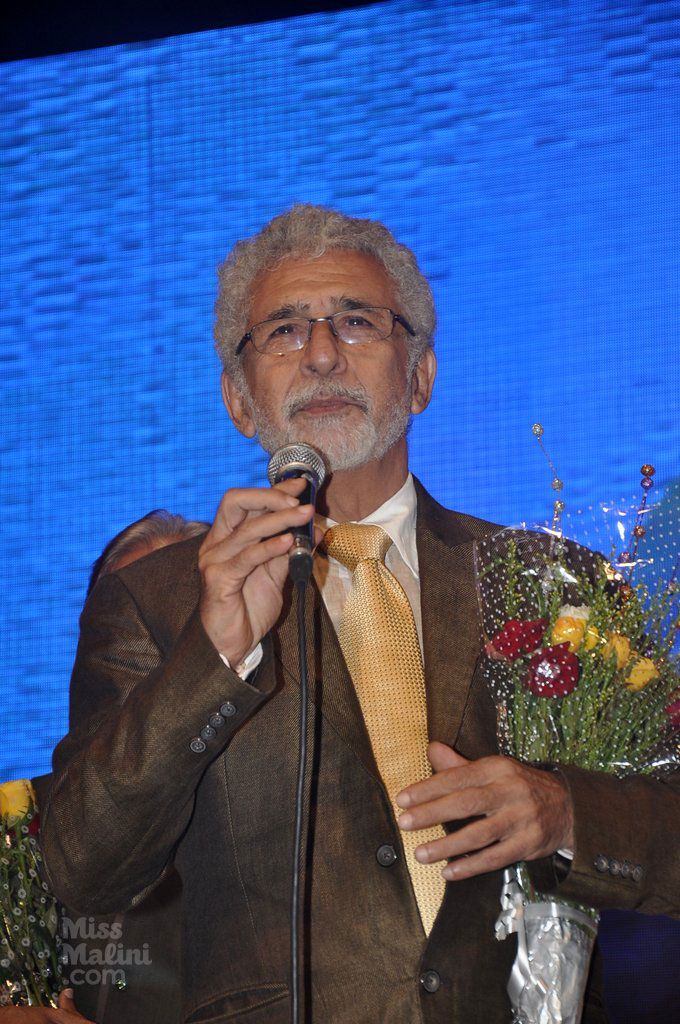
What, four and five? I didn’t even know boarding schools admitted kids that young. But it was time. That must either toughen you up or weaken you to death. He opined,
“No, I think it f*cks you up. I think so. [He pauses and looks away.] It suits certain people. I believed at one time it was great. Kids should go to boarding school. I don’t any more. I sent both my kids to Doon School. I’m not at all sure I did the right thing. We missed out on a large part of their growing up. I felt short changed having sent them there. They, of course, disagree, but I feel like I missed out. It would have been better if they grew up here.”
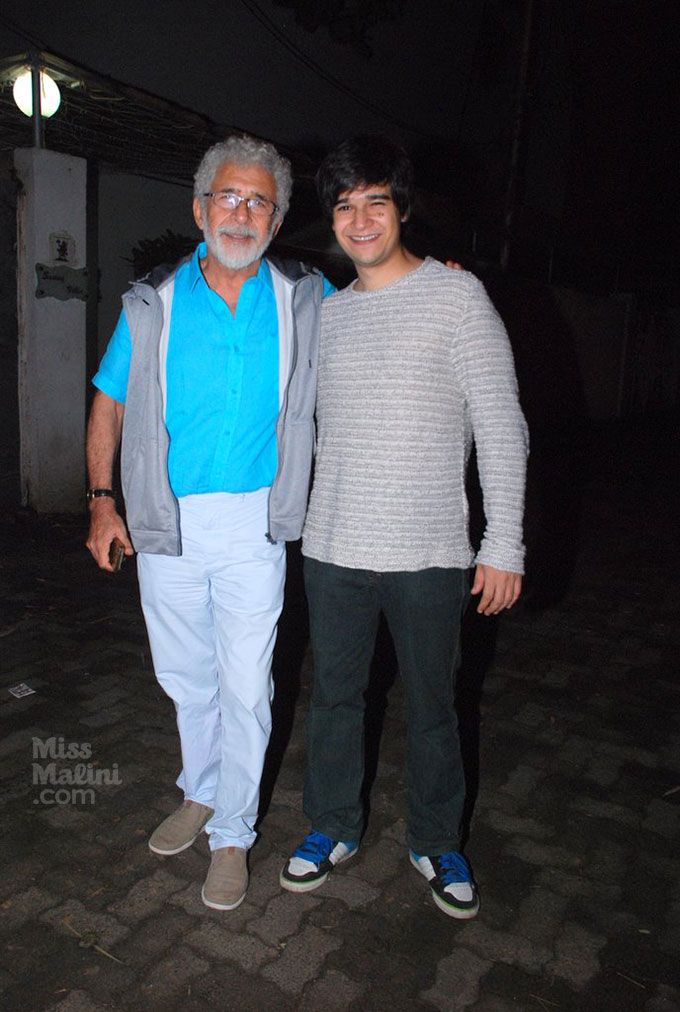
There was a moment of silence there. I let it go.
To the uninformed, there is a book on his life coming out that I’m personally so excited about. I have always thought, how hard it must be for anyone who is writing on their life to do so. At some point, looking back, do you judge yourself? Do you question your actions? Or worse, squirm at the sight of what you were? Is there a version of you you see? One so unpalatable it makes it hard for you to be honest about?
“Yes, that and more. I found myself re-examining my relationship with my father. Which was a very troubled one. Never healed till he died. We never made friends, we would not talk to each other. I was married when I was 20. I re-examined that. I have only written the book up to the point when Ratna and I married. There is a lot more to tell, although I didn’t want to make it a 700 page read. Also the pre-marriage was the tumultuous period of my life, the formative period I guess. More interesting to someone who is keen on me and my work to read, than the later part. Because after, it was more or less smooth sailing. The work had been done. One film after another, one play after another. No point in numerating. So I don’t know if I ever will write a sequel. What I may write is a supposedly fictional book about the film industry. [We both crack up.] It’s a really strange place [I agree]. It is strange and humorous. Either you felt humoured or it is an unending picnic. Everybody on a commercial movie, which is not strapped for funds is on an unending picnic. The shot is something to be gotten over with as soon as possible and then you sit down and have fun. The banter, the anecdotes… they fly fast and thick and I cannot tolerate anecdotes. I mean there are that many of them you can listen to. So I give it a miss and retreat to a book. I’ve never really been a part of the industry and they have always thought of me as the outsider. And I have also felt like one. When I did my first few commercial films [think Sunaina] I felt very ill at ease. I could not adjust to that kind of reality.”
I could not see him do that either.
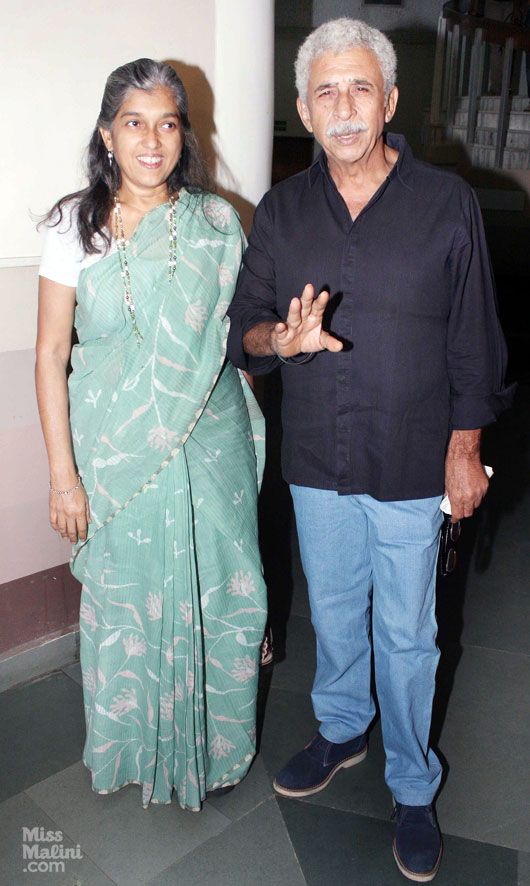
“I was unable to deliver what was required. When I was a student at drama school, I never dreamt that a day would come when I would have to sing songs to beautiful women. I thought, at the most, I’ll get these roles where I play a cop, a villain, I mean I have to earn my living. I have to eat. I have to get into movies. Cut to a bare five years later, I find myself in a film called Sunaina wherein I’m absolutely pathetic. I had no clue what I was doing. At the institute all I did was prepare myself for the kind of films I saw myself in. Like the ones Basu Chatterjee or Shyam Benegal were making. I worked so hard at removing all that bravado and narcissism from my work, whilst trying to focus on the gut of a character. He had got to be as real as spit. That was what I was after. Big mistake as far as commercial movies went. They don’t need you to be real, they need you to be attractive. I hadn’t a clue of how to sing songs. At the film institute, we had a class called playback where they would play a record and you were supposed to dance to it. I never attended that class. I was dreadful I was embarrassed to death. I felt so utterly wrong. The scenes the way a Mr. Bachchan can make sense of, that kind of dialogue, is what I should have studied. How does he do it? He and, before him, Dilip Kumar are the ones who can portray that with conviction, nonsensical as it may have been. I should have studied them, but I didn’t. I paid more attention to Polish and other European actors, not realising that these are not the kind of movies that are made here or ones I’ll be cast for. I realised it was an equal loss and an equal gain. I gained an ability to act in the real kind of movies but I lost the ability to play larger than life. Now it’s too late.”
If there is any actor in our industry who has had that perfect balance between art and commercial, I think it’s him. Even his recent outings in films like A Wednesday and Ishqiya are proof of it. I don’t know about you, but I’m terribly excited to watch Finding Fanny.
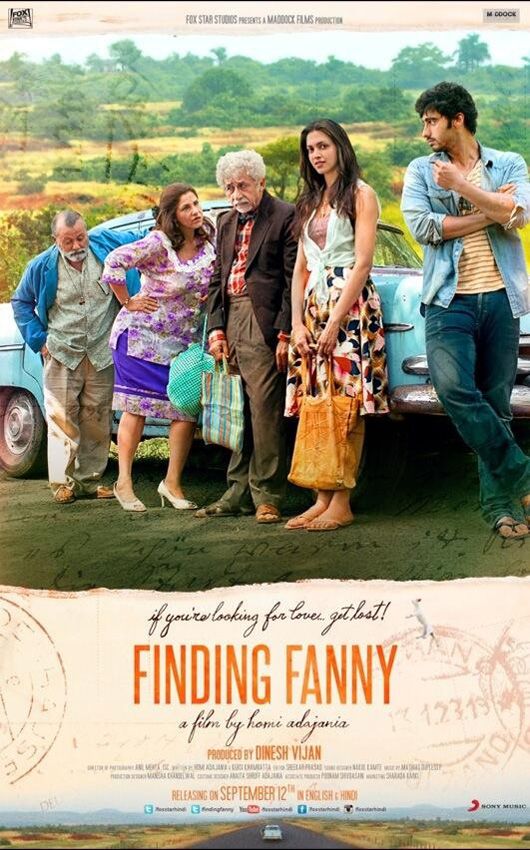
“I can’t define that film. It’s one of a kind. I enjoyed it very much. It’s totally off centre. I hated his last film. The whole film was shit and I told him so. I said, “I’m not working with you if you’re making films like this.” To which Homi Adajania said, “That’s why I didn’t approach you for it.” I thought, why would you do that? Which part could I have played? But Finding Fanny is what he wanted to do earlier, before Cocktail. I was not available at the time. He claims that he didn’t make it because of that though. I don’t believe him [he laughs]. I think he postponed it ’cause he could not get a backer. Then he returned after Cocktail and I agreed. It was great fun. It’s an off centre nonsensical film in a sense of Edward Lear nonsense, Stephen Leacock nonsense. I really don’t know how it will work with an audience though. I really hope it does. I always believe that a film made with conviction works, if there is a modicum of craft. And I think there is both those things in it. I hope they get that vein of humour you know, like a Wes Anderson kind. It was great fun though. I love Homi he is a good guy the rest of the cast was great too. The kids were lovely (Deepika Padukone and Arjun Kapoor). Dimple Kapadia is gorgeous and Pankaj Kapur keeps to himself a lot of the time. I wish he opened up a bit, but at the end of the day he delivers and that’s what counts. That’s the bottom line and he is just superb. A lot of positive vibes.”
I probed further about the cast, specifically the young leads, considering they are the most commercial part of the film…
“She is right for the part. She wasn’t such a big star when she was signed on, but she happened to have so many back to back hits she became one. It needed a gorgeous girl like that. Arjun is very right for his part as well. I haven’t seen the final film, but I hope it will come together well.”
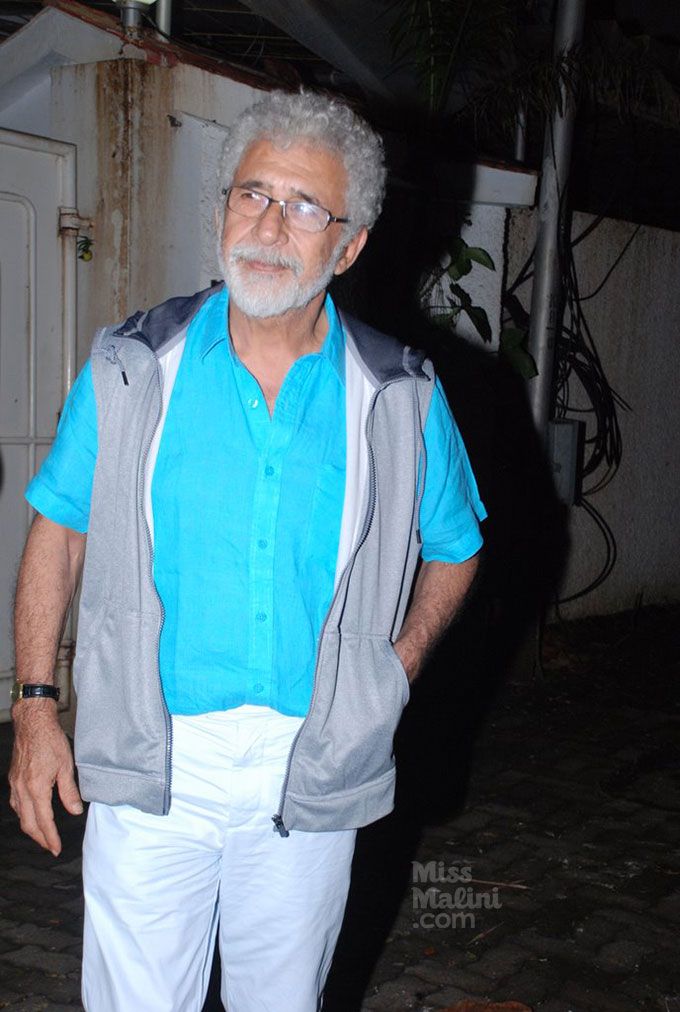
One look at his acting roster and it amazed me as to how many regional films he had done. The language must be tough? Learning it? Emoting with it? I mean language is an actor’s main tool, right?
“I won’t do it again. I did them ’cause you know, it would be a great challenge. I would learn a new language, a few cultural innuendos, but ultimately it’s too short a time to learn anything. Nor could I speak with conviction, because I was not thinking in that language. It’s very tough, although it takes away from the performance. You know South Indian faces are South Indian and North Indian faces are North Indian. I didn’t look the part at all. I was reasonably successful in a film called Godhuli made by Girish Karnad. It’s totally lost. You can’t even get a copy of it. I played a Brahmin priest. It was made in Hindi and Kannada. I think I gave a decent performance. I was really young and enthusiastic in those days. I was dying to tear any role I got to shreds. I stayed up all night, spoke Kannada quiet well, but still not good enough. They had to dub it which always takes away from the performance. The Kannada version exists, but the Hindi one is lost. Many years later I did another Kannada one in which again I just could not do it. Then Malayalam. Marathi and Gujarati are all right. I would not mind doing that again, but not the others. I also dabbled with a Punjabi film in Pakistan, so these languages are easier. The grammar is the same and the vocabulary is quiet common, so I enjoyed them. I’ve just been approached by a gentleman to act in a Sanskrit film. It’s funny as it’s not spoken anymore, but he still wants to make it. And my concern is, will anyone watch it? To which he said, “I just want to make it, because I do.” And my biggest question is, why are the characters talking in Sanskrit? Why aren’t they talking in Malayalam if they are living in Kerala? The temptation to go and shoot in Kerala was what got me to go and listen to it. All that greenery! [He laughs] He said, “Well you know, national award?” Can you believe this guy is actually making a film to win a national award? He has not got a word of his script written yet and he is talking national award [laughs…].”
Speaking of awards, I wondered how he felt about receiving the third and fourth highest civilian awards of our country. He laughed and said,
“It felt ok! Somebody lobbied for me and I got it and the other popular ones… I use them as doorknobs at my farm house.”
I almost fell of the chair! I mean there was not a shred of arrogance, but a childlike honesty about him. In my head, his cool quotient just went up a notch. That’s if it could go any higher.
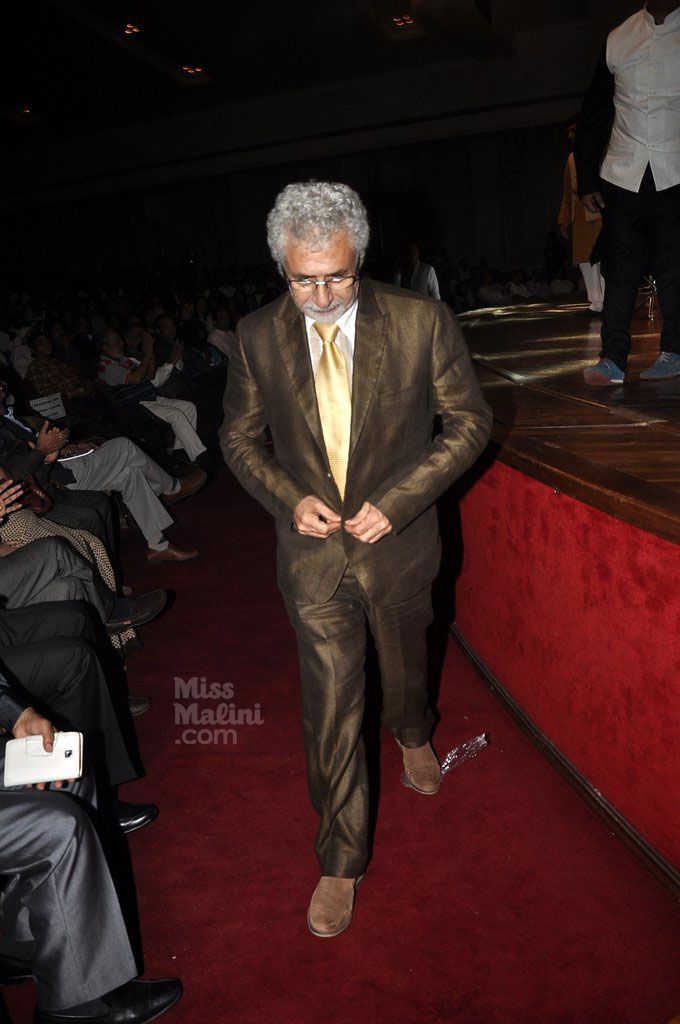
Apart from films, Naseer’s contribution to theatre is unparalleled! Along with Benjamin Gilani and Tom Alter, they started a company called Motley. Since its birth in 1979, it has established itself as a forerunner in the Indian theatre scene. Over the years, they have travelled extensively with their productions and garnered worldwide fame. I just had to ask about the company.
“Motley is flourishing. Going from strength to strength. Benjamin has not been very active the last couple of years, the last thing he did was Antigone. He later moved on to TV which worked well for him. Tom moved away from Motely a while ago, and he has been working in Delhi extensively. He is no longer with Motely either. But Akash Khurana, Benjamin Gilani, Ratna Pathak Shah and myself are still the nucleus. There is also Jairaj who has taken over the reins of the whole company. He manages everything for us. Ratna does a lot of the running around and decision making while Jairaj does all of the organising. I take most of the creative decisions. We are actually able to pay our actors and our team, which feels really good. And not pity shit, 100 rupees a show kind of thing. It’s great. Still can’t make a profession out of it, even in the Gujrati and Marathi plays. You just can’t. Even in the West, it doesn’t work. The competition is so much more there, that’s why even the guys in the background are so good. The dancers bit, actors are better than a lot of our stars. I’ve been offered a play on Broadway and the payment they offered was so bloody ridiculous, I told them to just fuck off. I mean I can’t block 6 months of my life for a fee I can make in a day.“
“Theatre just doesn’t pay the bills!”
True story!
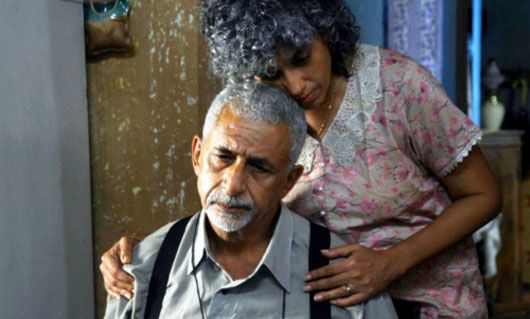
Right at that moment, his wife of many years and my personal favourite gal, Ratna Pathak Shah, walked in. It was like the gods sent her. I was about to ask him about her and there she was. I was curious. How? What? When? Where? How did they meet? Who stalked whom?
“We met through Satyadev Dubey. I had met him in the course of Nishant as he had written the dialogue for it. We hit it off quite well. At the time, I was still a student at the film institute. I felt really lucky to get that job. There was a strike at the institute by the acting students and Girish Karnad was the director. The strike ballooned up, we got beaten down, but apparently he was so impressed with what I did and said during the protest that he spoke to Shyam Benegal about me. It’s because of Girish, I got to meet Shyam. I then got offered Nishant. At the time I was in Bombay, living as a paying guest in Santacruz. There was a play brewing with Dubeyji and I really wanted to be a part of it. And who should I meet but Ratna… She was also in the play. I took to her the moment I saw her. [He ponders] ”Wow this girl is really nice man.” “I think I’d like to be friends with her.” She was the female lead in that play and I was her counterpart. Dubeyji introduced us. He had just had his teeth removed [mocks a toothless dialogue]. She heard my name as Shivendra Sinha. He was the guy who made a film during the art wave of the 70’s. I had made up my mind about her quite quickly. I knew she was the person I wanted to spend my life with almost immediately, I felt that. I saw the way she conducted herself and I thought… this is the girl I’m looking for. She, of course, does not believe this, but it’s the truth. There were a lot of other pretty girls in that play. It was all about sex and this and that and frustrated maidens and slivering nobles. That sort of thing. Complete nonsense. That’s when we became friends. From the moment I appeared on the horizon, her mother’s antennas started vibrating. [Laughs] She had a special antenna for such things. Ratna agreed to marry me even before I had any prospects or future or any hopes at all, which is so fantastic. Till today, I draw strength from that. She agreed to share my life when she saw that she is really taking a chance and that to me was great. We have had our ups and downs, but it’s been a great time. Most wonderful. Then Dina [Ratna’s mother] also came around. I found the worth of family through Ratna. I had abandoned my family. My brothers were very supportive through my period of struggle, but I thought that I had moved on with my life they with theirs. We had nothing to do with each other. Ratna made me see qualities in them that I had not known. She formed relations with all of them completely independent of me. It is a very happy blend. We have her family here and mine all over the place.”
I felt a sense of contentment in the room. Here is this legend talking to me about his wife, their story, and all I could see is this boy reminiscing about his lady love. I felt the love. I saw it.
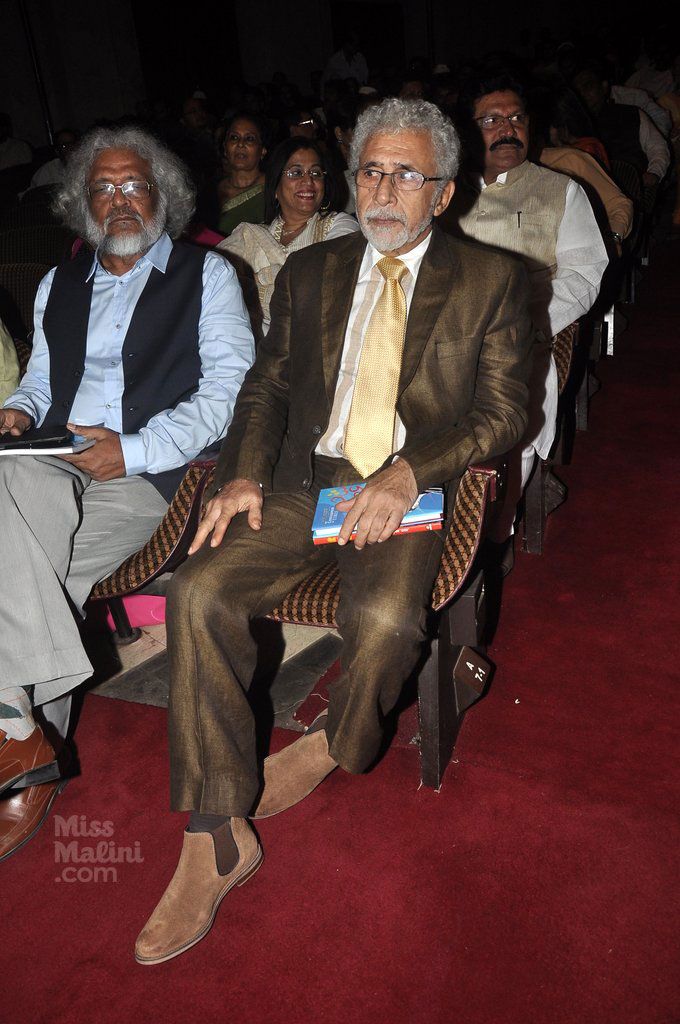
His most recent outing, that of a professional writer, didn’t surprise me at all. The stories of the life he had led, his experiences, and his wisdom has to be shared. I know I can barely wait!
“I have talked very candidly about my life. Not only how I developed as an actor, but about other aspects as well. I dare say it might be a tad titillating. [Smiles] When I began to write it, I didn’t find anything funny. I had no sense of humour, but I think I have been able to write about it with my tongue in my cheek. I imagine a lot of young actors would like to read it. Those who have followed my work. I don’t know if any star aspirants would take anything from it. I wrote it to have a good time. It started as a foreward when I found myself with nothing to do over the weekend. For my own entertainment really. It’s taken me twelve years to finish. Every time I felt like amusing myself, I would go and write a couple of pages. I did this over the years and it’s now three hundred pages long. I had abandoned it for months. Didn’t look at it and then suddenly go back. The moment I remembered something I thought was worth relating, I would go type it out. That’s how it happened. But I really didn’t think what kind of readership I would have or whether I would have any.”
That’s the thing about genius. It presents itself without the thought of reaction or fear of judgement. Just a commitment to craft and excellence. It embarks on a journey fueled by desire, adventure, and a hunger for learning. A mapless voyage we have all come to know as life. It reminded me of what James Agee once said,
“The goal is the same: life itself: and the price is the same: life itself.”
Pix: Viral Bhayani for MissMalini
